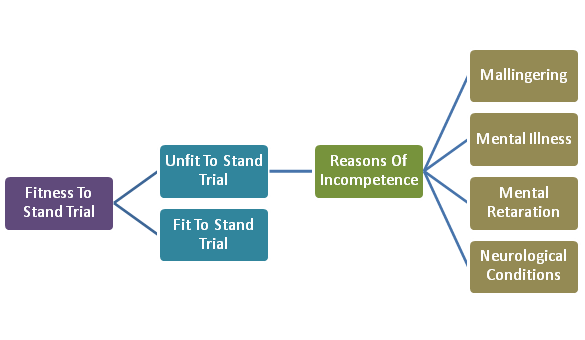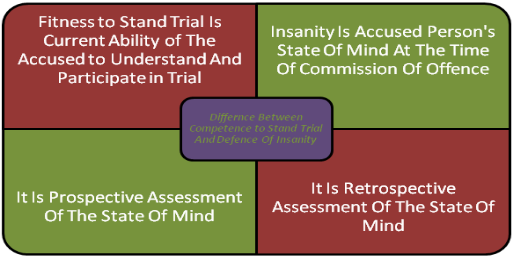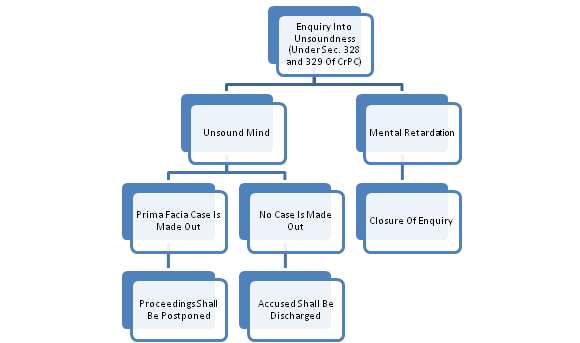This article has been written by Swati Mishra, pursuing a Certificate Course in Advanced Criminal Litigation & Trial Advocacy from LawSikho.
Table of Contents
Introduction
What happens if a person is being prosecuted under any law and does not possess the ability to understand what is happening to him? Subsequently, the court convicts him for 10 years. What do you think, is it making any sense to the civilised society?
So, the answer to this is a big ‘NO’. We all understand that it is against the principle of natural justice. In simple words, if a person is not able to defend himself, he is incompetent to face trial.
A man was arrested in 1951 from Silsang, a small village in Guwahati. He was booked for “causing grievous hurt”. Within a year of his arrest, he was transferred to a psychiatric hospital and was kept there for over 26 years. In 1967, the hospital authorities certified him as “fully fit” but instead of placing him to face trial or releasing him, he was again transferred to prison for another 28 years until he was released. The offence of grievous hurt attracts a maximum punishment of seven years but he spent 54 years of his life in detention. For the first 26 years, he was not fit for trial but he did not face trial even for once when he was declared fit. The man was none other than Machang Lalung who was released in 2005 after the intervention of the Hon’ble Supreme Court. He enjoyed a free life only for 2 years and died in 2007.
Competency to stand trial
An assessment that is done to test the mental abilities of individuals to defend their case is called, ‘fitness to stand trial’ or ‘competence to stand trial’. Thus, competency or fitness to stand trial refers to a defendant’s ability to understand and rationally participate in legal proceedings and to defend himself. Mental illness, mental retardation and certain neurological conditions may incapacitate the cognitive, emotional and behavioural faculties of an individual, consequently having a serious impact on the ability to defend the case. Accused, those who are unfit to stand trial are usually excluded from facing criminal prosecution and the trial is usually postponed until the person is judged competent.
So, psychiatrically incompetent accused are usually sent for treatment and will be treated until become competent. In civil proceedings, it is known as the capacity to sue and be sued and is different from proceedings under criminal law. The capacity to sue and be sued is related to contractual capacity. Order 32 Rule 15 of C.P.C, applies to persons found to be of unsound mind or having some mental infirmity who are unable to protect their interest before or during the pendency of suit they can sue or be sued through their next friend

Fitness to stand trial and defence of insanity
Defence of insanity and fitness to stand trial are different from each other. Section 84 IPC stating that, “Nothing is an offence which is done by a person who, at the time of doing it, by reason of unsoundness of mind, is incapable of knowing the nature of the act, or that he is doing, what is either wrong or contrary to law.” Section 333 of CrPC provides that the Magistrate can proceed with the case if it appears to him that the accused is of sound mind at the time of enquiry or trial but was of unsound mind at the time of the commission of the offence and was unable to understand the nature of his actions due to his unsoundness of mind. Therefore, defence of insanity means a person is of unsound mind when he is committing some offence which is punishable under the law. He is not in a state of understanding the nature and consequences of his action. Whereas fitness to stand trial is a later stage where a person is not in his mental wellbeing so understands the proceedings against him and is not in a situation to defend himself.
We all have watched various movies where a defence counsel requests the court to release the accused, he was of unsound mind at the time of the commission of the offence. This is the defence of insanity which is different from competence to stand trial.
insanity Is an Accused Person’s State Of Mind At The Time Of Commission Of Offence.

Evolution of the concept
The competency to stand trial was first articulated by the Supreme court of the United States as the assessment of the defendant’s competence to face trial. It was the infamous case of Dusky vs. US Trial, 1960 in which the court recognised the defendant’s right of competence evaluation before the trial proceeds. Two standard elements were outlined through this decision, the defendant must be able to understand the charges against him and he must possess the ability to aid his attorney in his defence. This means the defendant must possess rational as well as factual understanding. In Medina V. California,1992 The Supreme Court of the US stated that it is to be presumed that defendants are competent until the contrary is proven.
Concept of competency in different countries
In the US, fitness to stand trial is based on the three-prong test of the Dusky Case. They are:
- Factual Understanding
- Rational Understanding
- Ability to consult legal counsel
In Canada, Individual’s ability is decided by the following factors:
- Ability to understand the nature and object of proceedings
- Ability to understand the consequences of proceedings
- Ability to communicate to the counsel
In the Australian legal systems, a person is considered to be competent to stand trial if he or she is able to:
- Understand the court processes
- Understand the Charges made against him
- Has the ability to instruct the counsel
Need for assessment
The right to a fair trial is a human right and no person should be condemned unheard. How can we rely on criminal justice when the accused is unable to provide information to his counsel? If the criminal process is jeopardised then there would be no fair trial. So, to ensure a fair trial and to protect principles of natural justice assessment of the defendant’s ability to stand trial is done.
There are various provisions under the law that ensure a fair trial. They are:
- Article 14 of the International Covenant on Civil and Political Rights, recognizes the right to a fair trial.
- The concept of a fair trial recognised under the Constitution in Articles 14, 21, 22 and 39 A.
- Chapter XXV of the Code of Criminal procedure 1973 contains provisions as to the accused person of unsound mind (Sections 328, 329 and 330 of CrPC).
The Hon’ble Supreme Court in Zaheera Habibullah Sheikh V. State of Gujarat, 2006 stated that ‘Denial of a fair trial is as much injustice to the accused as is to the victim and the society.’
Indian scenario
The assessment of a defendant’s fitness to stand trial is done to ensure the autonomy and individual right to defence. Though the evaluation procedure is different from country to country the objective is the same. In India, several incidents are there that show pendency of trial due to incompetence of the accused to stand trial. No reliable factual data till now is available that can show a true number of pending cases due to the unfitness of the accused to face trial. There are several provisions to deal with the accused of unsound mind. There is a presumption under the law that every person is capable of entering the trial and can defend himself. If the accused wishes to take the defence of competency, then the burden to prove incompetence lies on himself. However, there are different provisions given under different statutes dealing with the competency of an accused to stand trial. Let’s have a look at these provisions:
Section 328 of Cr.PC contains provisions relating to the enquiry before a Magistrate. If the magistrate has reasons to believe that the accused is of unsound mind, this section casts a mandatory duty upon such Magistrate to hold an enquiry into unsoundness of the accused. The Magistrate refers such accused for examination by the civil surgeon, who if finds the person to be of unsound mind shall refer him to the psychiatrist or clinical psychiatrist for care treatment or prognosis of the condition. Upon findings of the psychiatrist, two conditions are there:
- If the accused is declared to be of unsound mind and found incapable of entering defence, the Magistrate shall examine the evidence and after hearing the defendant’s advocate without questioning the accused: ‘
- If a prima facie case is made out against the accused, the proceedings shall be postponed for such period until the accused becomes of sound mind and to be dealt with in the manner provided under section 330 of CrPC. If there is no prima facia case is made out then the accused shall be given discharge and to be dealt with in the manner provided under section 330 of CrPC.
- If the accused is a person with mental retardation, the Magistrate shall determine whether the person is capable to defend himself and if not, the Magistrate shall order the closure of enquiry and deal with the accused in the manner provided under section 330 of CrPC.
- Section 329 of CrPC contains similar provisions as to section 328 of CrPC, the main difference is with the procedure that section 328 applies to enquiry and 329 applies during a trial.
Section 330 of CrPC contains provisions relating to the release of an accused found to be of unsound mind under section 328 and 329 of CrPC. It says:
- If the offence is of such a nature in which bail may be taken, the Magistrate shall order the release of the accused on a condition that the unsoundness of mind or mental retardation of which the accused is suffering does not mandate the inpatient treatment or a friend or relative undertakes to obtain regular psychiatric treatment from a nearest medical facility and there shall be proper security that he shall be properly taken care of and shall be prevented from doing injury to himself or any other person.
- If the offence is of such a nature that that bail cannot be granted then he shall be kept at a place of regular psychiatric treatment. Also, the accused shall not be kept in a mental asylum in contravention to the rules of the Mental Health Act, 1987.
Section 331 of CrPC whenever an accused ceased to be of unsound mind who was declared to be of unsound mind under section 328 and 329 of CrPC the Magistrate may resume the inquiry or trial as the case may be.
Section 332 of CrPC, the inquiry or trial shall proceed if the Magistrate considers such accused as capable of defending himself.
Section 337 of CrPC describes the procedure where a prisoner of unsound mind is reported capable of making his defence. In the case where the prisoner is in jail, the Inspector General of Prisons and in cases where the prisoner is in a lunatic asylum, the visitor of such asylum or any of them shall certify that the prisoner is capable of making his defence such certificate shall be received as evidence and the Court/Magistrate will deal with such persons as provided under Section 332 of CrPC.
Section 338 of CrPC provides the procedure where a person detained under section 330(2) and section 335 of CrPC, is declared fit by the Inspector General of the prison or visitor of the asylum to be released.
Section 339 of CrPC provides for the delivery of the person of unsound mind to the care of a relative or friend with certain conditions if they desire to that such person shall be delivered to his care and custody.

Relevant case laws
In Gurjeet Singh vs. State Of Punjab, 1986 was held that the plea of insanity must first be determined by the medical evidence. The trial of an offence without determining the insanity violates section 329 of CrPC.
In Sankaran vs. State, 1994 it was a case of uxoricide. In this case, the plea of unsoundness of mind was raised for the first time during the examination under section 313 of Cr. PC. No witness was examined, no certificate was produced to prove the insanity of mind. Therefore, the conviction under section 302 of IPC was upheld.
In State of Maharashtra vs. Sindhi, 1975 The Hon’ble Supreme Court held that the word ‘trial’ includes reference under section 366(2).
Conclusion
The competency to stand trial is a legal construct. It deals with the mental capacity of an individual who is affected by some mental illness, mental retardation or any other neurological conditions. The mental disorder may be because of different reasons such as Depression, Schizophrenia, Alzheimer’s Disease, Epilepsy, Mental retardation, Substance-abuse disorders and disorders of childhood and adolescence. Not every person who is suffering from some mental disease is not competent to trial. The degree of mental illness matters a lot. It depends on the circumstances of each case. The assessment is done by psychiatrists. An accused cannot be prosecuted under the law until certified to be of sound mind.
Students of Lawsikho courses regularly produce writing assignments and work on practical exercises as a part of their coursework and develop themselves in real-life practical skill.
LawSikho has created a telegram group for exchanging legal knowledge, referrals and various opportunities. You can click on this link and join:
 Serato DJ Crack 2025Serato DJ PRO Crack
Serato DJ Crack 2025Serato DJ PRO Crack











 Allow notifications
Allow notifications


